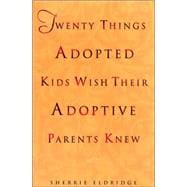
Note: Supplemental materials are not guaranteed with Rental or Used book purchases.
Purchase Benefits
What is included with this book?
| Adoption Through the Eyes of a Child | p. 1 |
| Hidden Losses | p. 3 |
| Entering Your Child's World | p. 13 |
| Twenty Things Your Adopted Child Wants You to Know | p. 23 |
| "I Suffered a Profound Loss Before I Was Adopted. You Are Not Responsible." | p. 25 |
| "I Need to Be Taught That I Have Special Needs Arising From Adoption Loss, of Which I Need Not Be Ashamed." | p. 33 |
| "If I Don't Grieve My Loss, My Ability to Receive Love From You and Others Will Be Hindered." | p. 43 |
| "My Unresolved Grief May Surface in Anger Toward You." | p. 60 |
| "I Need Your Help in Grieving My Loss. Teach Me How to Get in Touch With My Feelings About My Adoption and Then Validate Them." | p. 73 |
| "Just Because I Don't Talk About My Birth Family Doesn't Mean I Don't Think About Them." | p. 85 |
| "I Want You to Take the Initiative in Opening Conversations About My Birth Family." | p. 96 |
| "I Need to Know the Truth About My Conception, Birth, and Family History, No Matter How Painful the Details May Be." | p. 107 |
| "I Am Afraid I Was 'Given Away' by My Birth Mother Because I Was a Bad Baby. I Need You to Help Me Dump My Toxic Shame." | p. 116 |
| "I Am Afraid You Will Abandon Me." | p. 124 |
| "I May Appear More 'Whole' Than I Actually Am. I Need Your Help to Uncover the Parts of Myself That I Keep Hidden So I Can Integrate All the Elements of My Identity." | p. 131 |
| "I Need to Gain a Sense of Personal Power." | p. 138 |
| "Please Don't Say I Look or Act Just Like You. I Need You to Acknowledge and Celebrate Our Differences." | p. 144 |
| "Let Me Be My Own Person . . . But Don't Let Me Cut Myself Off From You." | p. 155 |
| "Please Respect My Privacy Regarding My Adoption. Don't Tell Other People Without My Consent." | p. 162 |
| "Birthdays May Be Difficult for Me." | p. 169 |
| "Not Knowing My Full Medical History Can Be Distressing at Times." | p. 179 |
| "I Am Afraid I Will Be Too Much for You to Handle." | p. 186 |
| "When I Act Out My Fears in Obnoxious Ways, Please Hang in There With Me, and Respond Wisely." | p. 193 |
| "Even If I Decide to Search for My Birth Family, I Will Always Want You to Be My Parents." | p. 200 |
| Appendix | |
| Organizations | p. 213 |
| Support Groups | p. 215 |
| Recommended Reading | p. 216 |
| Audio and Video Tapes | p. 218 |
| Bibliography | p. 219 |
| Table of Contents provided by Syndetics. All Rights Reserved. |
The New copy of this book will include any supplemental materials advertised. Please check the title of the book to determine if it should include any access cards, study guides, lab manuals, CDs, etc.
The Used, Rental and eBook copies of this book are not guaranteed to include any supplemental materials. Typically, only the book itself is included. This is true even if the title states it includes any access cards, study guides, lab manuals, CDs, etc.
Excerpted from Twenty Things Adopted Kids Wish Their Adoptive Parents Knew by Sherrie Eldridge
All rights reserved by the original copyright owners. Excerpts are provided for display purposes only and may not be reproduced, reprinted or distributed without the written permission of the publisher.